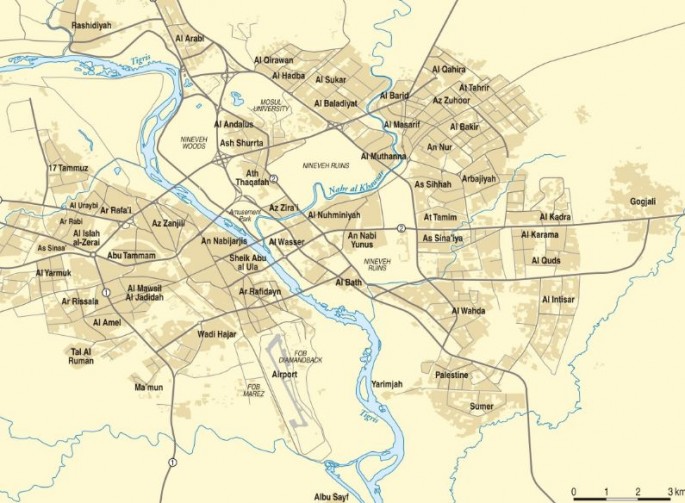Kurdish Peshmerga forces opened the long-awaited final offensive to recapture the city of Mosul (Al Mawsil) in Nineveh province from ISIL, taking seven villages on the first day of the offensive launched Oct. 17.
Kurdish media reported Kurdish fighters starting the offensive's ground assault on the Khazer front 30 kilometers east of Mosul. The Kurds advanced on ISIL-held villages from three directions while Iraqi security forces rolled forward from the south, with both attacks backed by artillery and air bombardments.
The Kurds liberated seven villages at Khazer supported by airstrikes from the United States and its coalition allies such as France. Peshmerga forces are advancing against ISIL in the Hamdaniya district to Mosul's southeast.
Spearheading the Iraqi forces' assault on Mosul are Iraq's elite Special Forces units, the most effective forces battling ISIL for the past two years.
Formally known as the Counter-Terrorism Service (CTS) but also called Iraqi Special Operations Forces or the Golden Division, these tough troops organized by the U.S. military helped battle al-Qaeda in Iraq (ISIL's predecessor), as well as Shiite militia. CTS has led the way in the war on ISIL with key victories across the country.
"This is the final battle. This is to be or not to be," said Sabah Noori, a spokesman for Iraqi Special Forces. "The future of Iraq is at stake in Mosul. And we will be in the front."
Kurdish front-line news reporters said ISIL tried to destroy Peshmerga positions with car bombs during the Peshmerga advance. U.S.-led coalition aircraft providing cover for the Kurds destroyed two of car bombs but one managed to get near its target before detonating.
"ISIS militants have lost the morale to fight and their situation is bad inside Mosul. Many militants have fled to Syria together with their families," said Saeed Mamuzini, a Kurdistan Democratic Party official from Mosul.
Despite being at the forefront of the fighting against the hated ISIL terrorists, the Kurds have agreed not to advance into the city itself and leave that job to the Iraqi Army and its police forces for political reasons.
"We've an agreement with the Iraqis and coalition that the Peshmerga won't be going to Mosul," said Jamal Iminiki, Chief of General Staff of the Peshmerga forces.
The Kurds said their attacks were being personally overseen by Kurdish President Masoud Barzani and Aziz Waisi, commander of the Kurdish Zeravani Special Forces.
The rapid advance of the Iraqis and the Kurds is a morale boosting start to take the last city held by ISIL in Iraq.
Iraqi Prime Minister Haber Haider al-Abadi appeared on Iraqi television in the early hours of Oct. 17 to announce the start of the long-awaited operation to liberate Mosul, Iraq's second largest city, from ISIL.
"The time of victory has come and operations to liberate Mosul have started," said al-Abadi. "Today I declare the start of these victorious operations to free you from the violence and terrorism of [ISIL]."
Military observers are confident of Mosul's eventual fall to the Iraqi Army and its coalition partners. The balance of forces stands overwhelmingly in the coalition's favor.
There are over 25,000 men attacking Mosul, which is defended anywhere from 3,000 to 5,000 ISIL fighters without air cover or heavy artillery. Analysts expect ISIL to abandon western Mosul to the advancing coalition forces and to make their stand in eastern Mosul, which is a heavily built up area packed with houses that are far easier to defend.
ISIL has been preparing its defenses for more than two years: digging tunnels, planting IEDs and filling trenches with oil to burn to provide cover from airstrikes.
The Kurds note that ISIS has a considerable force in Mosul and said many militants who were defeated in Ramadi, Tikrit and Baiji might be in the city. The battle for Ramadi took all of four months to complete and the coalition expects an even longer and bloodier battle for Mosul, which is still inhabited by some one million persons, and is the one of the largest cities in Iraq the size of Philadelphia in the United States.
"We are expecting up to six months of house-to-house fighting," said an official with the Kurdistan Regional Government
"It's going to be a long, long battle."




























